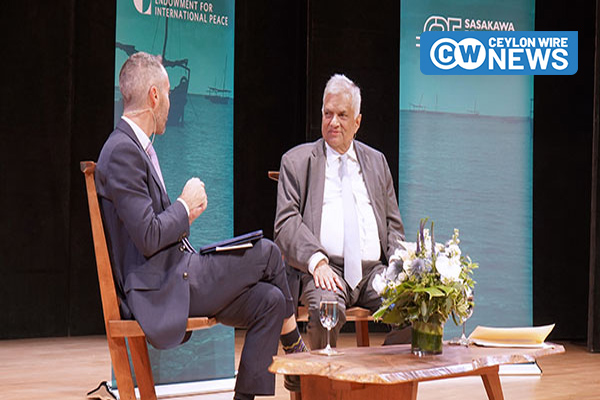President Ranil Wickremesinghe has asserted that Sri Lanka’s government does not align itself with either India or China and firmly stands for Sri Lanka’s interests above all else.
“Some time back a person asked me whether I am pro-Indian or pro-Chinese, so I said definitely I am not pro-Indian, and added by saying I am also not pro-Chinese. So he asked me, ‘then are you neutral?’ I said no I’m not neutral, I’m pro-Sri Lankan”, the Head of State asserted, adding that many countries do not understand the fact that Sri Lanka’s priorities are not the same as those of the ‘big powers’ and the others within the region.
Participating in the ‘Ocean Nations: The 3rd Annual Indo-Pacific Islands Dialogue,’ which was moderated by Dan Baer, Senior Vice President for Policy Research at the Carnegie Endowment for International Peace and hosted by the Carnegie Endowment and Sasakawa Foundation, President Wickremesinghe highlighted the reluctance of island nations in the Indian Ocean and South Pacific to become embroiled in the rivalry between major world powers.
The President emphasised that these nations are focused on their own priorities, including social, economic, and ecological development and seek to maintain their sovereignty and independence.
Island nations in the Indian Ocean and South Pacific have distinct priorities, unrelated to the Quad (comprising the US, India, Japan, and Australia) or China’s objectives, he said, adding that Sri Lanka is open to collaboration with any partners willing to respect its autonomy.
“We are prepared to work with any actor, state or non-state actors, who will help us to achieve our objectives. We are working with the West on one side, and we are working with China on the other”, he said in this regard.
He assured, however, that Sri Lanka is not ‘hedging back and forth’ in a bid to extract the most possible benefits from anyone, emphasising “Throughout our island we have to deal with all powers that come in. We may have played one against the other, but that is for our survival”.
“It is the inability to understand the nature of the Indian Ocean and the South Pacific [regions] which is creating this, None of the countries involved seem to understand what our [Sri Lanka’s] geopolitics are, and what we do “, he further said.
In terms of regional frameworks, President Wickremesinghe noted that China’s rise occurred within existing regional frameworks such as APEC and ASEAN, which many nations prefer to maintain. The recent expansion of great power rivalry beyond these frameworks has raised concerns among member nations.
He noted that the South Pacific and the Indian Ocean hold immense strategic value. The South Pacific is a vital hub for the US Navy and the Indian Ocean played a crucial role in World War II.
President Wickremesinghe noted, “The South Pacific which includes Hawaii – it is here that the US dominance of the Pacific established in WW2 and Battle of the Coral Sea and Midway as well as the shooting down of Admiral Yamamoto’s plane took place. The importance of the Indian Ocean was best described by Winston Churchill who said the most dangerous moment of war was the capture of Ceylon and consequently the loss of Indian Ocean.”
The Indo-Pacific concept has gained recognition, primarily due to mounting challenges from China, the President said, adding that it has prompted a re-evaluation of regional dynamics and cooperation, such as the Jakarta Concord within the Indian Ocean Rim Association (IORA).
The G7’s attempt to involve European powers and NATO in the Indo-Pacific was met with opposition, with only France expressing interest. This move was seen as violating IORA’s rules-based order, the President pointed out.
The President also noted that the Quad has shifted from a focus on security and dialogue to applying coordinated pressure in the region. While surface warfare threats are minimal in the Indian Ocean, the issue of submarine warfare needs to be addressed within IORA.
In terms of Security Dialogues, the President pointed out that the island nations find security dialogues acceptable but emphasize non-interference in their internal affairs. Many island nations, including Sri Lanka, have not engaged in high-level discussions regarding the Indo-Pacific. Recent developments such as the US opening an embassy in the Maldives were also noted.
The power balance in the Indian Ocean is evolving, influenced by ASEAN, the Russian-Ukraine war, and the emergence of BRICS+. This changing landscape favours the independence of island nations and calls for strengthened cooperation between IORA, ASEAN, and BRICS+.
In response to a question posed on the Hambantota port, President Wickremesinghe said Sri Lanka expressed concerns over the labelling of the Hambantota commercial port as a Chinese military base. The country is developing the Trincomalee harbour in cooperation with India and intends to raise the matter at international forums.









